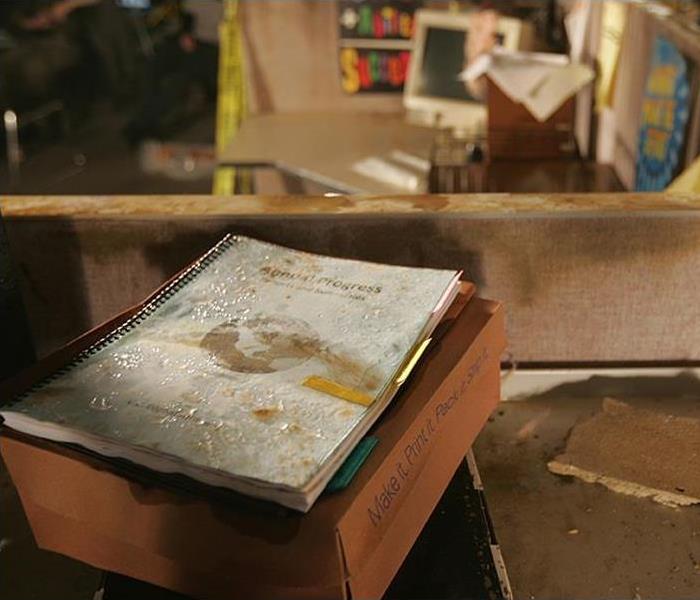Wrapping Your Mind Around A Natural Disaster
7/3/2017 (Permalink)
When you’re mentally prepared for something—anything—dealing with it is easier. That’s even true for dealing with a major fire, flood, or other natural disaster restoration. Storm damage or an earthquake can wreak havoc on land and property but they don’t have to cause such severe stress and fear that you sink into a debilitating state of mind. You can stay calm and effective after even the worst natural disaster. Here are some pointers.
1. Prepare physically
Preparing yourself physically helps prepare your mind. Have your home (or business) well protected from natural disaster threats. Know your emergency evacuation route. Have essentials and valuables in an emergency kit you can quickly grab on your way to safety. Preparing physically will give you and your family some peace of mind should a natural disaster strike. You’ll have a plan to follow and that can keep you calm and keep your stress level down. The same principle applies to your business and your employees.
In "How to Mentally Prepare for Disasters and Emergencies" Ramani Durvasula, a licensed clinical psychologist, says preparation is key. “[Preparation] can largely help because it can address real anxieties about clean water, food, etc.,” Ramani says. “With those real issues addressed, it makes it easier to simply focus on the psychological symptoms of anxiety and manage those without worrying about being hungry.”
2. Acknowledge the disaster’s severity without letting it overwhelm you
We all have much less understanding of how we would react in an emergency than we think we do. Things like five foot high flames, cars floating down flooded streets, and 90 mile-an-hour winds have a way of causing extreme emotion and stress. Our logic and reason can be severely taxed. Allow yourself to take in what’s happened but don’t become immobile. Accept reality but do respond. You can always do something to make things better, safer, or start the recovery process.
Think about and realize what you may have to do during and after a natural disaster. Yes, your role could be physically, mentally, and emotionally challenging. By accepting and understanding that reality now, you’ll be better able to manage your actions and decisions if an emergency occurs. By acknowledging the damage after a disaster you’ll begin to assess the best course of action and generate the ideas you need to start moving on a positive path.
Get Smarter About Dealing With Natural Disasters. Call SERVPRO of Manchester/Mansfield at 860-461-7194.
3. Try the power of visualization
First responders, fire fighters, and other people who often have to deal with major natural disasters sometimes use the strategy of envisioning worst-case scenarios. They think about the sights, sounds, smells, and emotions that occur during a major natural disaster. By envisioning in detail, they create in their brains a bookmark similar to an actual experience. Later, the brain can “refer back to” what the person envisioned. The brain searches for how the person reacted to the earlier experience and the decisions made then, even if the experience and decisions were only in the mind. Fabricated memories can help direct behavior toward logic and reason in critical, stressful situations.
4. Redefine courage
Think of courage not as the state of lacking any fear but as the ability to be afraid but act effectively in spite of your fear. Survivors and heroes feel fear just like you and I. What’s the difference between them and us? They have learned to manage their fear. They acknowledge the crisis and look ahead and think about what they need to do next to be safe, protect others, and recover. Know that in an emergency you will be fearful but the best thing you can do is to act in ways that get you out of the fearful situation.
5. Use relaxation techniques
Some experts recommend getting your fear and emotions under control through breathing, relaxation, and meditation exercises. If you practice and trust your relaxation techniques you can adapt those techniques to almost any situation or emergency. You might also consider cognitive restructuring. It’s a useful technique for transforming negative thinking into more positive thinking. Cognitive restructuring can change attitudes, values, or beliefs in ways that alter self-expression.
Help Is Here
The team at SERVPRO of Manchester/Mansfield has specialized training and experience in fire restoration services, natural disaster prevention, and natural disaster cleanup. Call SERVPRO of Manchester/Mansfield (860-461-7194) anytime, 24/7.
SERVPRO of Manchester/Mansfield
100 Peters Road, Bloomfield, CT 06002
IICRC Certified
Noemi Garcia
Franchise Owner
Call (860)461-7194
24-hour emergency service






 24/7 Emergency Service
24/7 Emergency Service